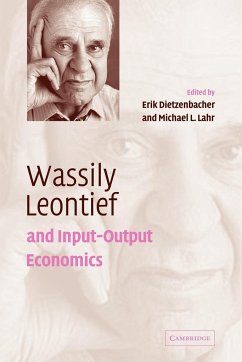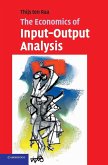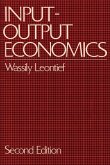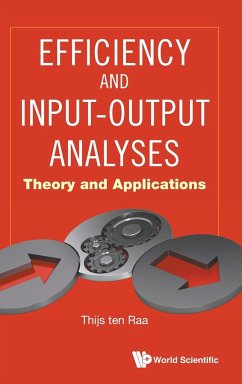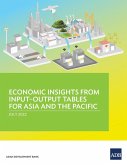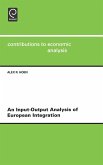Erik Dietzenbacher, Michael L. Lahr
Wassily Leontief and Input-Output Economics
Herausgeber: Dietzenbacher, Erik
Erik Dietzenbacher, Michael L. Lahr
Wassily Leontief and Input-Output Economics
Herausgeber: Dietzenbacher, Erik
- Broschiertes Buch
- Merkliste
- Auf die Merkliste
- Bewerten Bewerten
- Teilen
- Produkt teilen
- Produkterinnerung
- Produkterinnerung
A collection of papers in memory of Wassily Leontief, focusing on his contributions to economics.
Andere Kunden interessierten sich auch für
![The Economics of Input-Output Analysis The Economics of Input-Output Analysis]() Thijs Ten RaaThe Economics of Input-Output Analysis75,99 €
Thijs Ten RaaThe Economics of Input-Output Analysis75,99 €![Input-Output Economics Input-Output Economics]() Wassily W. LeontiefInput-Output Economics125,99 €
Wassily W. LeontiefInput-Output Economics125,99 €![The Sustainability Practitioner's Guide to Multi-Regional Input-Output Analysis The Sustainability Practitioner's Guide to Multi-Regional Input-Output Analysis]() The Sustainability Practitioner's Guide to Multi-Regional Input-Output Analysis64,99 €
The Sustainability Practitioner's Guide to Multi-Regional Input-Output Analysis64,99 €![The Sustainability Practitioner's Guide to Input-Output Analysis The Sustainability Practitioner's Guide to Input-Output Analysis]() The Sustainability Practitioner's Guide to Input-Output Analysis46,99 €
The Sustainability Practitioner's Guide to Input-Output Analysis46,99 €![EFFICIENCY AND INPUT-OUTPUT ANALYSES EFFICIENCY AND INPUT-OUTPUT ANALYSES]() Thijs Ten RaaEFFICIENCY AND INPUT-OUTPUT ANALYSES152,99 €
Thijs Ten RaaEFFICIENCY AND INPUT-OUTPUT ANALYSES152,99 €![Economic Insights from Input-Output Tables for Asia and the Pacific Economic Insights from Input-Output Tables for Asia and the Pacific]() Asian Development BankEconomic Insights from Input-Output Tables for Asia and the Pacific105,99 €
Asian Development BankEconomic Insights from Input-Output Tables for Asia and the Pacific105,99 €![An Input-output Analysis of European Integration An Input-output Analysis of European Integration]() A. HoenAn Input-output Analysis of European Integration204,99 €
A. HoenAn Input-output Analysis of European Integration204,99 €-
-
-
A collection of papers in memory of Wassily Leontief, focusing on his contributions to economics.
Hinweis: Dieser Artikel kann nur an eine deutsche Lieferadresse ausgeliefert werden.
Hinweis: Dieser Artikel kann nur an eine deutsche Lieferadresse ausgeliefert werden.
Produktdetails
- Produktdetails
- Verlag: Cambridge University Press
- Seitenzahl: 420
- Erscheinungstermin: 31. Januar 2008
- Englisch
- Abmessung: 229mm x 152mm x 25mm
- Gewicht: 679g
- ISBN-13: 9780521049436
- ISBN-10: 0521049431
- Artikelnr.: 23329167
- Herstellerkennzeichnung
- Libri GmbH
- Europaallee 1
- 36244 Bad Hersfeld
- gpsr@libri.de
- Verlag: Cambridge University Press
- Seitenzahl: 420
- Erscheinungstermin: 31. Januar 2008
- Englisch
- Abmessung: 229mm x 152mm x 25mm
- Gewicht: 679g
- ISBN-13: 9780521049436
- ISBN-10: 0521049431
- Artikelnr.: 23329167
- Herstellerkennzeichnung
- Libri GmbH
- Europaallee 1
- 36244 Bad Hersfeld
- gpsr@libri.de
Erik Dietzenbacher is Associate Professor of International Economics and Business at the University of Groningen, The Netherlands. He is co-editor of Input-Output Analysis: Frontiers and Extensions (with Michael L. Lahr, 2001), Input-Output Analysis (three volumes, with Heinz D. Kurz and Christian Lager, 1998) and is currently editor of Economic Systems Research, the official journal of the International Input-Output Association.
List of contributors; List of figures; List of tables; Preface; Part I.
Reflections on Input-Output Economics: 1. A portrait of the master as a
young man Paul A. Samuelson; 2. Leontief's 'magnificent machine' and other
contributions to applied economics Karen R. Polenske; 3. Leontief and the
future of the world economy Emilio Fontela; 4. International trade:
evolution in the thought and analysis of Wassily Leontief Faye Duchin; 5.
Leontief's input-output table and the French Development Plan Henri Aujac;
6. Leontief and dynamic regional models William H. Miernyk; 7. Experiences
with input-output and isomorphic analytical tools in spatial economics Jean
H. P. Paelinck; 8. Leontief and Schumpeter: a joint heritage with surprises
Andrew Brody and Anne P. Carter; 9. Some highlights in the life of Wassily
Leontief - an interview with Estelle and Wassily Leontief Christian
DeBresson; Part II. Perspectives of Input-Output Economics: 10. A
neoclassical analysis of total factor productivity using input-output
prices Thijs Ten Raa; 11. What has happened to the Leontief Paradox? Edward
N. Wolff; 12. The decline in labor compensation's share of GDP: a
structural decomposition analysis for the United States, 1982 to 1997 Erik
Dietzenbacher, Michael L. Lahr and Bart Los; 13. An oligopoly model in a
Leontief framework Robert E. Kuenne; 14. Economies of plant scale and
structural change Iwao Ozaki; 15. Technological change and accumulated
capital: a dynamic decomposition of Japan's growth Masahiro Kuroda and Koji
Nomura; 16. Japan's economic growth and policy-making in the context of
input-output models Shuntaro Shishido; 17. Contributions of input-output
analysis to the understanding of technological change: the information
sector in the United States Lawrence R. Klein, Vijaya G. Duggal and Cynthia
Saltzman; 18. How much can investment change trade patterns? An application
of dynamic input-output models linked by international trade to an Italian
policy question Clopper Almon and Maurizio Grassini; 19. Social cost in the
Leontief environmental model: rules and limits to policy Albert E. Steenge;
Subject index; Author index.
Reflections on Input-Output Economics: 1. A portrait of the master as a
young man Paul A. Samuelson; 2. Leontief's 'magnificent machine' and other
contributions to applied economics Karen R. Polenske; 3. Leontief and the
future of the world economy Emilio Fontela; 4. International trade:
evolution in the thought and analysis of Wassily Leontief Faye Duchin; 5.
Leontief's input-output table and the French Development Plan Henri Aujac;
6. Leontief and dynamic regional models William H. Miernyk; 7. Experiences
with input-output and isomorphic analytical tools in spatial economics Jean
H. P. Paelinck; 8. Leontief and Schumpeter: a joint heritage with surprises
Andrew Brody and Anne P. Carter; 9. Some highlights in the life of Wassily
Leontief - an interview with Estelle and Wassily Leontief Christian
DeBresson; Part II. Perspectives of Input-Output Economics: 10. A
neoclassical analysis of total factor productivity using input-output
prices Thijs Ten Raa; 11. What has happened to the Leontief Paradox? Edward
N. Wolff; 12. The decline in labor compensation's share of GDP: a
structural decomposition analysis for the United States, 1982 to 1997 Erik
Dietzenbacher, Michael L. Lahr and Bart Los; 13. An oligopoly model in a
Leontief framework Robert E. Kuenne; 14. Economies of plant scale and
structural change Iwao Ozaki; 15. Technological change and accumulated
capital: a dynamic decomposition of Japan's growth Masahiro Kuroda and Koji
Nomura; 16. Japan's economic growth and policy-making in the context of
input-output models Shuntaro Shishido; 17. Contributions of input-output
analysis to the understanding of technological change: the information
sector in the United States Lawrence R. Klein, Vijaya G. Duggal and Cynthia
Saltzman; 18. How much can investment change trade patterns? An application
of dynamic input-output models linked by international trade to an Italian
policy question Clopper Almon and Maurizio Grassini; 19. Social cost in the
Leontief environmental model: rules and limits to policy Albert E. Steenge;
Subject index; Author index.
List of contributors; List of figures; List of tables; Preface; Part I.
Reflections on Input-Output Economics: 1. A portrait of the master as a
young man Paul A. Samuelson; 2. Leontief's 'magnificent machine' and other
contributions to applied economics Karen R. Polenske; 3. Leontief and the
future of the world economy Emilio Fontela; 4. International trade:
evolution in the thought and analysis of Wassily Leontief Faye Duchin; 5.
Leontief's input-output table and the French Development Plan Henri Aujac;
6. Leontief and dynamic regional models William H. Miernyk; 7. Experiences
with input-output and isomorphic analytical tools in spatial economics Jean
H. P. Paelinck; 8. Leontief and Schumpeter: a joint heritage with surprises
Andrew Brody and Anne P. Carter; 9. Some highlights in the life of Wassily
Leontief - an interview with Estelle and Wassily Leontief Christian
DeBresson; Part II. Perspectives of Input-Output Economics: 10. A
neoclassical analysis of total factor productivity using input-output
prices Thijs Ten Raa; 11. What has happened to the Leontief Paradox? Edward
N. Wolff; 12. The decline in labor compensation's share of GDP: a
structural decomposition analysis for the United States, 1982 to 1997 Erik
Dietzenbacher, Michael L. Lahr and Bart Los; 13. An oligopoly model in a
Leontief framework Robert E. Kuenne; 14. Economies of plant scale and
structural change Iwao Ozaki; 15. Technological change and accumulated
capital: a dynamic decomposition of Japan's growth Masahiro Kuroda and Koji
Nomura; 16. Japan's economic growth and policy-making in the context of
input-output models Shuntaro Shishido; 17. Contributions of input-output
analysis to the understanding of technological change: the information
sector in the United States Lawrence R. Klein, Vijaya G. Duggal and Cynthia
Saltzman; 18. How much can investment change trade patterns? An application
of dynamic input-output models linked by international trade to an Italian
policy question Clopper Almon and Maurizio Grassini; 19. Social cost in the
Leontief environmental model: rules and limits to policy Albert E. Steenge;
Subject index; Author index.
Reflections on Input-Output Economics: 1. A portrait of the master as a
young man Paul A. Samuelson; 2. Leontief's 'magnificent machine' and other
contributions to applied economics Karen R. Polenske; 3. Leontief and the
future of the world economy Emilio Fontela; 4. International trade:
evolution in the thought and analysis of Wassily Leontief Faye Duchin; 5.
Leontief's input-output table and the French Development Plan Henri Aujac;
6. Leontief and dynamic regional models William H. Miernyk; 7. Experiences
with input-output and isomorphic analytical tools in spatial economics Jean
H. P. Paelinck; 8. Leontief and Schumpeter: a joint heritage with surprises
Andrew Brody and Anne P. Carter; 9. Some highlights in the life of Wassily
Leontief - an interview with Estelle and Wassily Leontief Christian
DeBresson; Part II. Perspectives of Input-Output Economics: 10. A
neoclassical analysis of total factor productivity using input-output
prices Thijs Ten Raa; 11. What has happened to the Leontief Paradox? Edward
N. Wolff; 12. The decline in labor compensation's share of GDP: a
structural decomposition analysis for the United States, 1982 to 1997 Erik
Dietzenbacher, Michael L. Lahr and Bart Los; 13. An oligopoly model in a
Leontief framework Robert E. Kuenne; 14. Economies of plant scale and
structural change Iwao Ozaki; 15. Technological change and accumulated
capital: a dynamic decomposition of Japan's growth Masahiro Kuroda and Koji
Nomura; 16. Japan's economic growth and policy-making in the context of
input-output models Shuntaro Shishido; 17. Contributions of input-output
analysis to the understanding of technological change: the information
sector in the United States Lawrence R. Klein, Vijaya G. Duggal and Cynthia
Saltzman; 18. How much can investment change trade patterns? An application
of dynamic input-output models linked by international trade to an Italian
policy question Clopper Almon and Maurizio Grassini; 19. Social cost in the
Leontief environmental model: rules and limits to policy Albert E. Steenge;
Subject index; Author index.

